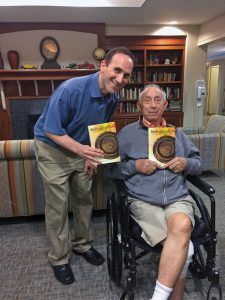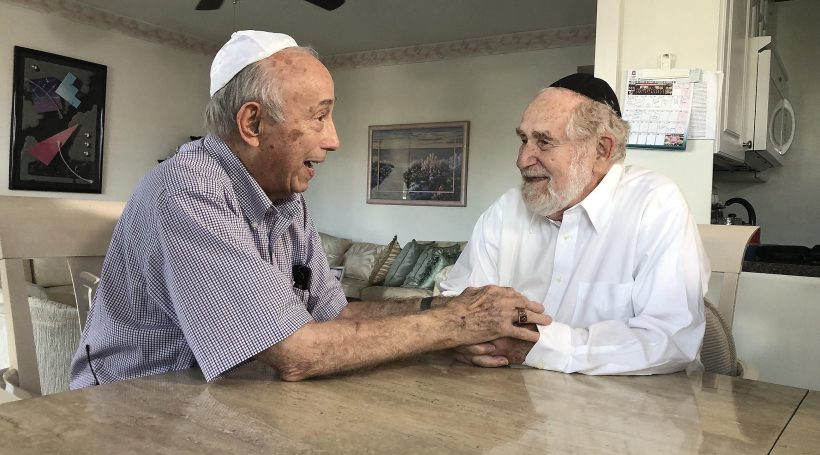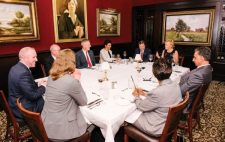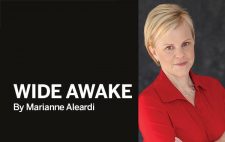
Larry Hanover and Fred Behrend
I was standing amid palm trees, soaking up Florida sunshine on a mid-February day and thinking how perfect a moment this was. But I was nowhere near a sandy beach or the sound of the surf. Not even an inground pool or a little jacuzzi. I was watching a 92-year-old guy trudging across a parking lot with his walking stick, headed for the door of a 91-year-old guy’s condo in the kind of cookie-cutter, gated senior-citizen development that is as common in the Sunshine State as jughandle turns in the Garden State.
But miracles come in all manner and form. Life had taken me here to film two Holocaust survivors seeing each other for the first time in 80 years – since Kristallnacht (the Night of Broken Glass), when flames were shooting out from synagogues and shards of glass from Jewish storefronts littered sidewalks throughout Nazi Germany. This was a different kind of perfect.
I first saw Fred Behrend, the elder of the two, when he was speaking to my son’s Hebrew school class at Congregation Beth El in Voorhees in spring 2010.
His story was fascinating. With the enactment of the Nuremberg Laws banning Jews from public school, his parents were forced to withdraw him from his school in the small city of Lüdenscheid. In Cologne, some 65 miles away, his parents found a cantor named Max Baum who was willing to take Fred in so he could attend a Jewish-run school, the same one as the cantor’s children Margot and Heinz.
Then came Kristallnacht on the night of Nov. 9, 1938. As Fred walked to school in the morning, he saw one beautiful synagogue on fire, and then another. When he arrived at school, however, it looked like it, too, was in flames (it was actually the attached synagogue).
“What do you think my reaction was?” he said, with a twinkle in his eye as he paused for dramatic effect. “Best day of my life! No school today!”
Kids and parents laughed. The answer was, well, disarmingly honest. What kind of Holocaust survivor was this? The kind that convinced me, a former longtime reporter, that I ought to get back into writing. That I should write this man’s book. Little did I realize I was along for the ride of my life – through history, through miracles past and present, through something that feels like a real-life trip through the magical Harry Potter-themed park at Universal.
“I don’t think I have anything very interesting to say,” he protested at first. “I just wrote down these stories for my children.”
In fact, he was a tough interview initially. He was so sheltered by his parents from the dangers of Nazi Germany that when his father was arrested back home and thrown into a concentration camp, he took his mother’s word that it was no bigger a deal than a long business trip. Fred talked distantly at first, as if it all happened to someone else.
But he warmed up, and the stories soon flowed. Forced to leave everything behind, his family escaped to an exotic land called Cuba. Then came the brushes with history in the U.S. Army in 1946 stemming from his ability to speak German.
He talked of his time watching over Wernher von Braun, the German scientist who surrendered to America and eventually became the father of our space program. One time, von Braun saw a blueprint that resembled a bicycle wheel with just a few spokes. He told Fred that humans would one day live in orbit on such a space station, “and it will happen in your lifetime.” Fred told him he was crazy.
There was even a miracle. While on a service call to repair a woman’s TV, the customer asked where he came from. “Lüdenscheid,” he replied. “I’m certain you’ve never heard of it.” But she had, and he began to shake inside as the woman recalled that a boy from Ludenscheid, whose name she had long forgotten, had once lived in her home so he could attend school.
“Is your first name Margot,” he asked.
“Yes, yes, it is,” she replied.
With tears in his eyes, he took her by the hands and said, “I am that boy.”
I was proud of the book we published in 2017, “Rebuilt from Broken Glass,” encapsulating these wonderful stories and more. I was the one shaking inside as I stood before an audience at the U.S. Holocaust Memorial Museum in Washington, D.C., for our kickoff event, realizing the significance of what we had achieved.
I marveled as Fred retold his stories on our book tour. He’s the male version of Betty White. People absolutely adore him. At the Collingswood Book Festival, three different women came up insisting on a hug and a photo with him.
But the excitement wore off as 2017 turned into 2018. The book signings slowed. Life gradually began returning to normal.
I had forgotten the lesson of the very book I’d spent years writing, though. Fred’s life is never, ever ordinary. On Nov. 9, Fred’s daughter, Evelyn, texted me. There was a cellphone video I had to see.
Fred was speaking at Politz Day School in Cherry Hill that morning. He was telling the story of Kristallnacht and having last seen Heinz Baum and his sister exactly 80 years ago to the day. Rabbi Avraham Glustein, head of the school, dashed out of the room for a few minutes. The video began with the rabbi back in the room, holding a phone.
“Your first name?” Glustein said into the phone as he handed it to Fred.
“Heinz,” the voice responded.
“Oh my God,” Fred said.
The rabbi had seen Heinz (now Henry) Baum speak at a wedding prenuptial earlier. Now he had reunited them. “I was shocked and surprised,” Fred later said. “Very seldom am I ever speechless.”
Henry lives near Detroit, but it turned out the two men had spent decades wintering just 15 miles apart in Florida. They pledged to meet.
The story was spreading. It hit the “Courier-Post,” then “Fox 29.” On back-to-back days, a major Holocaust survivor-related organization urged us to apply to its film-grant program, and Joe Fab, Emmy-nominated director for the 2004 Holocaust documentary “Paper Clips,” said if we wanted
to do a documentary, he was all aboard. This documentary was a thing willing itself to happen. We felt compelled to launch the fundraising campaign that, if successful, will turn Fred into a star and this ink-stained writer into a co-director/co-producer. Regardless, we had to film this reunion.
So that’s how I found myself in Deerfield Beach, Florida, last February, with a camera crew, walking with Fred across the parking lot and then dashing inside the Baum home to witness a moment that was a lifetime in the making.
How did it go? There was a hug that neither man will forget. The year seemed to roll back to 1938 as the two joked like pre-bar mitzvah kids all over again. And then they compared stories, finding that whenever each spoke publicly, it turned out their primary theme was always the same.
“Hitler did not win,” Henry said, pausing between words for effect.
“No,” Fred replied, “he certainly did not.”
Larry Hanover is a co-producer and co-director of the documentary “Rebuilt from Broken Glass,” now in development. He’s an author and editor living in Cherry Hill.














